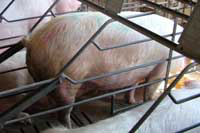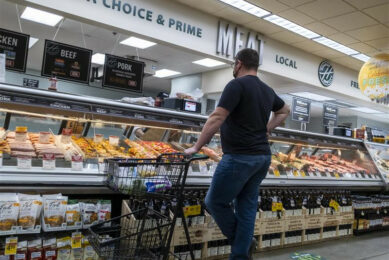What If? – Sow housing

What if the entire pig industry in a given country was a single company? And what if all the retailers (grocery, food service and restaurants) had to go talk to the single company head and ask for changes? Let’s say they were to ask for a change from gestation crates to group housing. Wouldn’t the retailers expect to pay more for a change in production technology? Wouldn’t the pig company say: sure, if you want it this way, this is what it will now cost. But that is not how it is happening.
Some consumers and some retailers are asking for pork raised from mothers who were not in gestation crates. Fair enough. Will they pay more for it? It seems they should, but actually, if they will pay more, the cost is hidden and will work itself out over time as an added cost of goods. It is a frustrating situation for all.
The consumer is not an innocent partner here. We can use many countries and USA states as an example to show the fickleness of the consumer. Let’s take our friends in California for a start. And eggs make the fickle consumer easy to observe. In 2008, Californians voted 63% to 37% to ban battery cages for laying hens (and gestation crates for sows and veal crates)1. When those consumers voted, they already had access to cage-free eggs in the grocery stores. Cage-free eggs were far less than 63% of the market – only 5% of the market!2 So consumers voted to force themselves to buy cage-free eggs. They did not vote to pay the farmers to convert to cage-free systems. The economic cost to themselves was less important than their desire to see the animals out of cages for animal welfare reasons.
Is the irony clear here. Consumers voted to force themselves to buy only a certain kind of egg – one that they could have bought, but were not buying. And they had no concern for the cost to the farmers.
Some countries have given farmers grants to convert from gestation crates to group housing. This softens the blow to the farmer, but it disconnects the responsibilities of the buyer from making demands on the seller that have real costs.
What if the consumers and retailers were to say to the farmers. Look, we used to want simply low-cost food, but now we have certain requirements. And we are willing to pay for these changes to get implemented. That is the way a mature relationship works. They pay for the product with certain features and the supplier then changes methods and gives it to them. Seems logical. It is not what is happening in the world.
I remember more than one conversation in corporate pig offices that went like this. If they want straw bedding and will pay for it, we’ll buy up straw and give it to the pigs! If they want anything and are willing to pay for it – they can have it.
But this idea that activists criticize the industry and cause changes in the market place and through government rules disassociates the producer-consumer relationship. It would be easier if it was a one-on-one conversation, but that is impossible at the moment. We need to find ways to educate the public about the cost to implement the changes they want – science based or emotion-based does not matter – if they pay they can have it.
The consequences of not having this conversation are clear. Smaller farmers cannot afford to make these changes. Nor do they often market directly to people who might pay more. Every shift in production technology throws smaller producers out of business and allows larger farms to gain more market share. The consumer’s disconnect with the farmers only contributes to the consolidation of the industry. I suspect that if you put that up for a vote, the public wouldn’t like that either. Still, they are forcing themselves to have access to products that they would not otherwise buy. For now.
1 California_Proposition_2_(2008)
2 Growth_of_US_cage-free_egg_production_expected_to_continue











